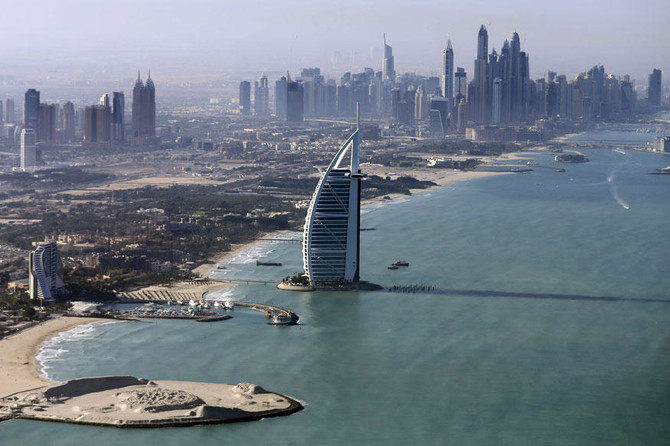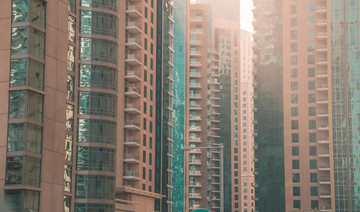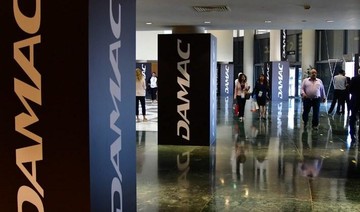DUBAI: S&P Global, the ratings agency, painted a grim picture for the real estate sector in Dubai, with a meaningful recovery in property prices expected only after 2022.
At a presentation to journalists in the Dubai International Financial Center, S&P analyst Sapna Jagtiani said that under the firm’s “base case scenario,” the Dubai real estate market would fall by between 5 and 10 percent this year, roughly the same as the fall in 2018, which would bring property prices to the levels seen at the bottom of the last cycle in 2010, in the aftermath of the global financial crisis.
“On the real estate side we continue to have a very grim view of the market. While we expect prices to broadly stabilize in 2020, we don’t see a meaningful recovery in 2021. Relative to the previous recovery cycle, we believe it will take longer time for prices to display a meaningful recovery,” she said.
S&P’s verdict adds to several recent pessimistic assessments of the Dubai real estate market. Jagtiani said that conditions in the other big UAE property market, in Abu Dhabi, were not as negative, because “Abu Dhabi never did ramp up as much in 2014 and 2015 as Dubai.” S&P does not rate developers in the capital.
She added that a “stress scenario” could arise if government and royal family related developers — such as Emaar Properties, Meraas, Dubai Properties and Nakheel — which have attractive land banks and economies of scale, continue to launch new developments.
“In such a scenario, we think residential real estate prices could decline by 10-15 percent in 2019 and a further 5-10 percent in 2020. In this case, we expect no upside for Dubai residential real estate prices in 2021, as we expect it will take a while for the market to absorb oversupply,” she said.
S&P recently downgraded Damac, one of the biggest Dubai-based developers, to BB- rating, on weak market prospects.
However, Jagtiani said that, despite the “significant oversupply” from existing projects, several factors should held stabilize the market: Few, if any, major product launches; improved affordability and “bargain hunting” by bulk buyers; and a resurgence of Asian, especially Chinese, investor interest in the market.
Jagtiani also said that government measures such as new ownership and visa regulations and reduction in government fees could help prevent prices falling more sharply, as well as “increased economic activity related to Dubai Expo 2020, which is expected to attract about 25 million visitors to the emirate.”
The outlook on property was part of a challenging assessment of the credit-worthiness of the emirate. “In our view, credit conditions deteriorated in Dubai in 2018, reducing the government’s ability to provide extraordinary financial support to its government related entities (GREs) if needed,” S&P said in a report. “The negative outlook on Dubai Electricity and Water
Authority (DEWA) partly reflects our concern that a real estate downturn beyond our base case could out increased pressure on government finances,” the report said.
It pointed out that about 70 percent of government revenues come from non-tax sources, including land transfer and mortgage registration fees, as well as charges for housing and municipality liabilities, as well as dividends from real estate developers it controls, like Emaar and Nakheel.
S&P was generally comfortable with the credit ratings of the emirate’s banking system, which has an estimated 20 percent exposure to real estate. “Banks in the UAE tend to generally display a good level of profitability and capitalization, giving them a good margin to absorb a moderate increase in risks,” the report said.
Dubai real estate market recovery to be seen as of 2022: S&P
Dubai real estate market recovery to be seen as of 2022: S&P

- The outlook on property was part of a challenging assessment of the credit-worthiness of the emirate
- S&P was generally comfortable with the credit ratings of the emirate’s banking system
Open Forum Riyadh to discuss digital currency, AI, and mental health

- The event will run in parallel to the WEF’s Special Meeting on Global Collaboration
LONDON: The Open Forum Riyadh — a series of public sessions taking place in the Saudi capital on Sunday and Monday — will “spotlight global challenges and opportunities,” according to the organizers.
The event, a collaboration between the World Economic Forum and the Saudi Ministry of Economy and Planning, will run in parallel to the WEF’s Special Meeting on Global Collaboration, Growth and Energy for Development, taking place in Riyadh on April 28 and 29.
“Under Saudi Vision 2030, Riyadh has become a global capital for thought leadership, action and solutions, fostering the exchange of knowledge and innovative ideas,” Faisal F. Alibrahim, Saudi minister of economy and planning, said in a press release, adding that this year’s Open Forum being hosted in Riyadh “is a testament to the city’s growing influence and role on the international stage.”
The forum is open to the public and “aims to facilitate dialogue between thought leaders and the broader public on a range of topics, including environmental challenges, mental health, digital currencies, artificial intelligence, the role of the arts in society, modern-day entrepreneurship, and smart cities,” according to a statement.
The agenda includes sessions addressing the impact of digital currencies in the Middle East, the role of culture in public diplomacy, urban development for smart cities, and actions to enhance mental wellbeing worldwide.
The annual Open Forum was established in 2003 with the goal of enabling a broader audience to participate in the activities of the WEF, and has been hosted in several different countries, including Cambodia, India, Jordan and Vietnam.
The panels will feature government officials, artists, civil-society leaders, entrepreneurs, and CEOs of multinationals.
This year’s speakers include Yazeed A. Al-Humied, deputy governor and head of MENA investments at the Saudi Pubic Investment Fund; Princess Reema Bandar Al-Saud, Saudi Arabia’s ambassador to the US; and Princess Beatrice, founder of the Big Change Charitable Trust and a member of the British royal family.
Michele Mischler, head of Swiss public affairs and sustainability at the WEF, said in a press release that the participation of the public in Open Forum sessions “fosters diverse perspectives, enriches global dialogue, and empowers collective solutions for a more inclusive and sustainable future.”
Meituan looks to hire in Saudi Arabia, indicating food delivery expansion

SHANGHAI: Chinese food delivery giant Meituan is seeking to hire staff for at least eight positions based in Riyadh, in a sign it may be looking to Saudi Arabia to further its global expansion ambitions, according to Reuters.
The jobs ads, which is hiring for KeeTa, the brand name Meituan uses for its food delivery operations in Hong Kong, is seeking candidates with expertise in business development, user acquisition, and customer retention, according to posts seen by Reuters on Linkedin and on Middle Eastern jobs site Bayt.com.
Meituan did not immediately respond to a request for comment by Reuters on its plans for Saudi expansion.
Bloomberg reported earlier on Friday that the Beijing-based firm would make its Middle East debut with Riyadh as the first stop.
Since expanding to Hong Kong in May 2023, Meituan’s first foray outside of mainland China, speculation has persisted that its overseas march would continue as the firm searches for growth opportunities, with the Middle East rumored since last year to be one area of possible expansion.
“We are actively evaluating opportunities in other markets,“ Meituan CEO Wang Xing said during a post-earnings call with analysts last month.
“We have the tech know-how and operational know-how, so we are quietly confident we can enter a new market and find an approach that works for consumers there.”
IMF opens first MENA office in Riyadh

RIYADH: The International Monetary Fund has opened its first office the Middle East and North Africa region in Riyadh.
The office was launched during the Joint Regional Conference on Industrial Policy for Diversification, jointly organized by the IMF and the Ministry of Finance, on April 24.
The new office aims to strengthen capacity building, regional surveillance, and outreach to foster stability, growth, and regional integration, thereby promoting partnerships in the Middle East and beyond, according to the Saudi Press Agency.
Additionally, the office will facilitate closer collaboration between the IMF and regional institutions, governments, and other stakeholders, the SPA report noted, adding that the IMF expressed its appreciation to Saudi Arabia for its financial contribution aimed at enhancing capacity development in its member countries, including fragile states.
Abdoul Aziz Wane, a seasoned IMF director with an extensive understanding of the institution and a broad network of policymakers and academics worldwide, will serve as the first director of the Riyadh office.
Saudi minister to deliver keynote speech at Automechanika Riyadh conference

RIYADH: Saudi Arabia’s Deputy Minister of Investment Transaction Saleh Al-Khabti is set to deliver the keynote speech at a global automotive aftermarket industry conference in Riyadh.
Set to be held from April 30 April to May 2 in the Saudi capital’s International Convention and Exhibition Center, Automechanika Riyadh will welcome more than 340 exhibitors from over 25 countries.
Al-Khabti will make the marquee address on the first day of the event, which will also see participation from Aftab Ahmed, chief advisor for the Automotive Cluster at the National Industrial Development Centre, Ministry of Industry and Mineral Resources.
Saudi Arabia’s automotive sector is undergoing a transformation, with the Kingdom’s Public Investment Fund becoming the major shareholder in US-based electric vehicle manufacturer Lucid, and also striking a deal with Hyundai to collaborate on the construction of a $500 million-manufacturing facility.
Alongside this, Saudi Arabia’s Crown Prince Mohammed bin Salman launched the Kingdom’s first electric vehicle brand in November 2022.
Commenting on the upcoming trade show, Bilal Al-Barmawi, CEO and founder of 1st Arabia Trade Shows & Conferences, said: “It is a great honor for Automechanika Riyadh to be held under the patronage of the Saudi Arabian Ministry of Investment, and we’re grateful for their continued support as the event goes from strength-to-strength.
“The insights and support we’ve already received have been invaluable, and we look forward to continuing this relationship throughout the event and beyond.”
This edition of Automechanika Riyadh will feature seven product focus areas, including parts and components, tyres and batteries, and oils and lubricants.
Accessories and customizing, diagnostics and repairs, and body and paint will also be discussed, as well as care and wash.
Aly Hefny, show manager for Automechanika Riyadh, Messe Frankfurt Middle East, said: “The caliber of speakers confirmed to take part at Automechanika Riyadh is a testament to the event’s growth and prominence within the regional automotive market.
“We have developed a show that goes beyond the norm by providing a platform that supports knowledge sharing and networking while promoting the opportunity to engage with key industry experts and hear the latest developments, trends and innovations changing the dynamics of the automotive sector.”
Aramco-backed S-Oil expects Q2 refining margins to remain steady then trend upward

SEOUL: South Korea’s S-Oil forecast on Friday that second-quarter refining margins will be steady, supported by regular maintenance in the region, then trend upward in tandem with higher demand as the summer season gets underway, according to Reuters.
Over the January-March period, the refiner said it operated the crude distillation units at its 669,000-barrel-per-day oil refinery in the southeastern city of Ulsan at 91.9 percent of capacity, compared with 94 percent in October-December.
S-Oil, whose main shareholder is Saudi Aramco, plans to shut its No. 1 crude distillation unit sometime this year for maintenance, the company said in an earnings presentation, without specifying the time.

















